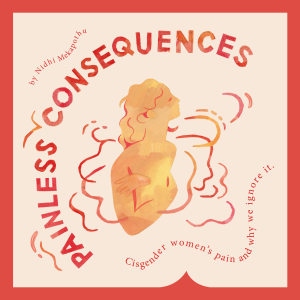
Invisible Illnesses
by Ivonne Marais | May 23, 2018
Having a period is not a unique experience. Many of us have had and will have periods. The symptoms and challenges that accompany them are experienced by each individual and by all women; they connect us together in mutual pain and discomfort. But those with endometriosis suffer more than most. The word ‘endometriosis’ may be familiar to some but the disease’s symptoms (and the severity of them) are not at all well known. I do not have endometriosis but I know a close friend who has struggled with the disease. The symptoms are debilitating and all-consuming. Lena Dunham’s recent hysterectomy should give non-sufferers some idea of quite how debilitating the disease can be. It’s a hard disease to live with and an even harder one to talk about. Unfortunately, many sufferers do not have Dunham’s platform, or her commitment to breaking down societal taboos.
Until recently, I knew very little about endometriosis other than the name, which had been mentioned to me by my gynecologist. The first discussion that my friend and I had about the disease came about after she was forced to cancel our plans due to what she termed a ‘bad period’. Since periods are experienced by more than half the world’s population I thought I had some idea of what a bad period meant. And as someone who often had to cancel plans due to uncomfortable or unexplainable circumstances I did not bring it up again. Eventually, she told me that she was suffering from endometriosis. She hadn’t told me earlier because other women had called her out for being ‘soft’. The logic here is very similar to the ‘everyone gets sick’ argument I explained in last week’s post. ‘We have all had bad periods, just deal with it’ was something she often had to face. And the discussion got much worse in a work environment. Taking leave due to a period – or, as a student, missing a class or getting an extension – is universally frowned upon. Discussing your period is still seen as a taboo. It’s even harder to talk about it in a work environment with a superior, especially when that superior is a man. So we suffer in silence – and that’s just with a period rather than a debilitating chronic illness like endometriosis.
As I do not suffer from endometriosis, it I cannot speak for the community. But I do know about the difficulties faced by female chronically ill patients. I am very familiar with our cultural aversion to speaking out about our health for fear that we will be stigmatized for not meeting the ‘strong woman making it in a man’s world’ trope. So many aspects of our experience of illness are affected by whether we are male or female. Even our interactions with doctors are mediated through gender. When I was younger, a number of doctors linked my then-undiagnosed ailments to my period or suggested that I was over-exaggerating my symptoms. In an earlier age, they might have diagnosed me with hysteria. We no longer see hysteria as an official diagnosis. But all too often, people erroneously view a woman’s medical complaints and symptoms as connected to a faulty reproductive system, her sexual activity or the presumption that she is lying/overreacting. Friends seeking help for serious undiagnosed conditions have been given constant tests for STDs. Others have had their mental health called into question when they have complained of chronic pain or fatigue. A recent visit to a new specialist led to an uncomfortable discussion in which the male doctor insisted that my hypothyroidism was linked to my ovaries. I tried to explain that my condition had been diagnosed and successfully treated in the past. I was ignored.
The difficulty of finding a sympathetic and competent doctor means that it is hardly surprising that woman so rarely speak out about their health issues in a professional situation. If a doctor thinks you are hysterical then what will your department think? There are more women in academia than in most other fields. As such, you might expect that students would face relatively less discrimination and disbelief. But a faculty must work within a system. Individual departments, or members of departments, do not necessarily have the power to allow a student to get an extension or miss an exam for period-related symptoms. And the wider societal aversion to women’s bodies and health – the view that women’s health is a ‘gross’ subject – impacts on how these discussions are held. The ludicrous assertion that Hillary Clinton was not fit for the presidency after she contracted pneumonia is one for the best examples of this. Pneumonia is not gender-specific; it doesn’t affect only women. Nonetheless, this example illustrates the way that illness in women is conflated with weakness and inability to perform. We must find a way to break down these gendered divides in our discussion around illness and our treatment of chronically ill women.
Photo: Man Vyi




